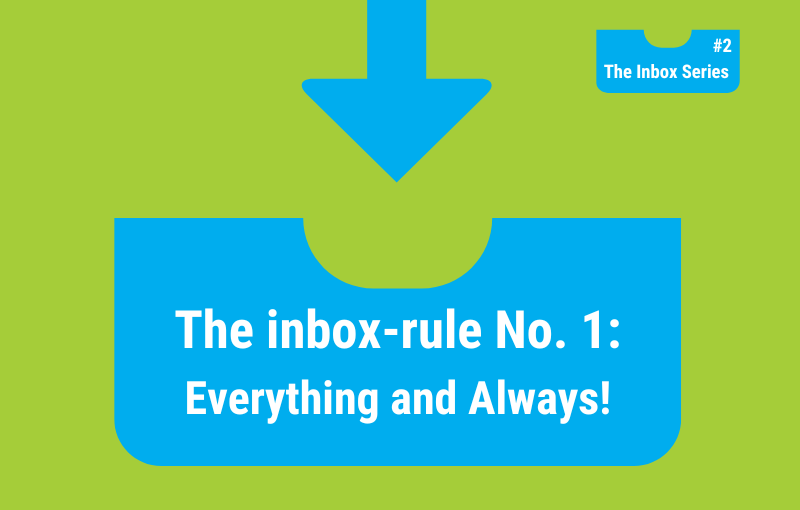In the first article of this series, I talked about why we need inboxes – if we want to get good at getting things done and organised.
I listed the inboxes that easily come to mind – like our email inbox, our mailbox, and the in-tray in the office.
I also came up with lots of other examples of containers or places that we use as inboxes in various daily life circumstances. And I talked about the purpose and benefits of inboxes.
This is a quick summary:
What are inboxes, and what’s their purpose?
Inboxes are temporary storage areas for things that need to get done/organised in the future.
These storage areas
-
- offer an easy and quick way to get things out of the way,
- ensure that individual items don’t get lost,
- are supposed to store things temporarily,
- make sorted-away items retrievable,
- offer quick overviews of pending tasks,
- help sort and prioritise items.
Today, I want to discuss what we need to do to make an inbox work. We need to follow just a few rules.
Important requirements of a well-functioning inbox.
Inboxes can only do their job – help us get things done and organised – if we do our job.
3 simple inbox rules
There is ONE RULE we must stick to ALL THE TIME.
It’s the absolute minimum requirement of any organisational system.
It’s also the only requirement – if you are happy with the very basic and simplistic results that a very basic and simplistic organisational system produces.
=> RULE NUMBER 1: Everything and always!
Everything that belongs in a specific inbox must always end up in that inbox.
Examples:
Think about your calendar. Your calendar can only reliably help you organise your time if you transfer every appointment and every otherwise time-bound commitment to it.
Or consider your paperwork inbox (which I will discuss in more detail in the next article):
Your paperwork inbox doesn’t have a chance to work efficiently if you don’t feed it reliably and consistently. If you, for example, put the mail into the box on some days, yes, but leave it on the garage shelves or place it on the kitchen counter or somewhere else on other days, your paperwork inbox can’t function properly.
You can only easily and reliably find that important invoice that you need to pay today, for example, if there is definitely only one place where it could be – the paperwork inbox, the place where every piece of paper lives before you need it or decide what to do with it.
You could have a functioning (although very simplistic) paperwork-organisation system even if you decided to do nothing else with your papers (no sorting, decluttering, filing, etc.).
As long as you just stick to this one rule and consistently collect all your paperwork in that one inbox, you are in a safe place. Because you can be certain that you will always be able to find any piece of paper you need to find.
Additional rules that drastically increase the worth and efficiency of your inboxes:
=> RULE NUMBER 2: Regular check-ups!
Schedule regular appointments with your inbox (daily or weekly) to review all current content, so you are always roughly aware of the papers that are waiting for your attention/action.
As said above, you will survive without checking your inbox regularly, but you will feel more in control and in charge – you will feel better – if you make sure that you know what’s going on there in that box.
Regular check-ups are a necessity if you want to follow the final rule – the one that will help you to actively get things done:
=> RULE NUMBER 3: Regular decisions and actions!
Make decisions regularly about what to do with the stuff in the inbox – and then do it.
For example, decide which of the groceries in your fridge have become clutter – they are rotten or far over their expiration date – and must go. And then throw them in the bin immediately.
The inbox for physical paperwork is the topic of the next article.
It’s super easy to install and maintain a well-functioning simple paperwork inbox.
This inbox could be(come) the only element of your paperwork organisation – or it could be(come) the entry port to your paperwork management system.
HOW CAN I HELP YOU?
Are you tired?
Tired of trying to (re)organise the various areas of your life entirely on your own?
Fortunately, you don’t have to figure it out all by yourself.
We can do it together.
You can decide to get my support, advice, and guidance – and achieve the desired changes in your life so much faster and easier.

